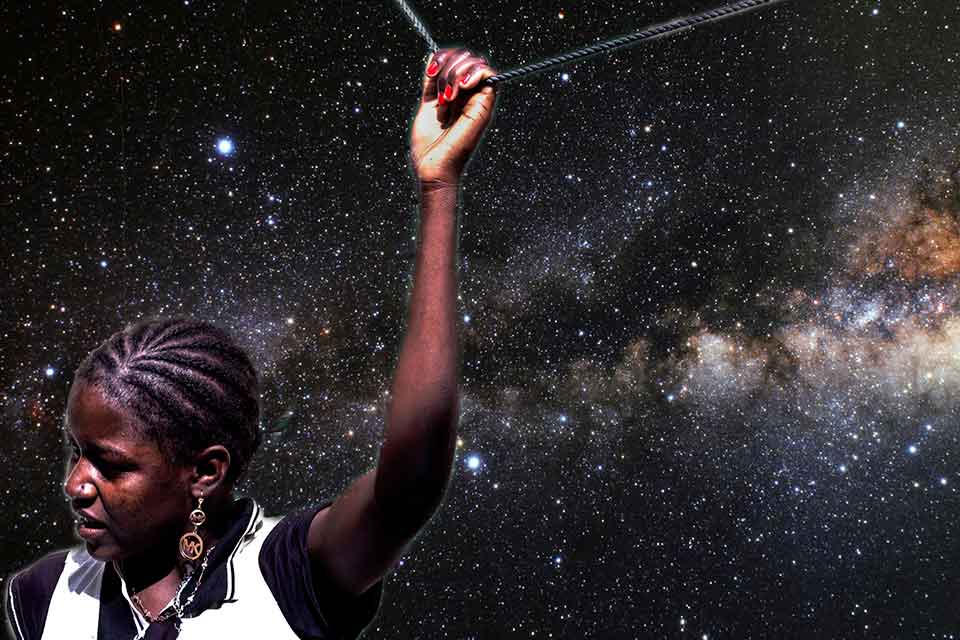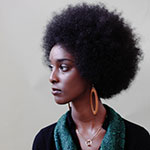Dark Matter Girls

Series editor’s note: In Ladan Osman’s piece “Dark Matter Girls,” the poet quietly asks herself, and by extension us, how we see Black girls, dark-skinned girls, girls that do not fit into the expectations of others. She says, I am chaos, incomprehensible; what kind of world is this, in which Black girls are othered before they can even understand it? But the poet goes further than that; with her inquisitive mind, she quietly carves out spaces in between, in which the Black girl can see herself reflected back, in which she can see herself and others. In this quest to carve out such a space, the poet also inquires about the type of world that can contain the ones who have not been defined or recognized, and yet sharpened through it, one way or another. From the intimate setting of a home to the world beyond her borders, the Black girl has been othered, silenced, denied, rejected, made invisible, or worse, she was made to believe that she was invisible. But Osman’s stance is clear as the steady handhold that never breaks; with this piece, she instructs the world to be careful with the Black girl, and by doing so, she yanks her out of invisibility, letting us bear witness to this new seeing. – Mahtem Shiferraw
Dark Matter Girls
by Ladan Osman
for Toyin Salau
I don’t want to rot under the soil. I don’t want
my eye or my young heart to turn into dust.
—Reyhaneh Jabbari
*
I am both nonwhite and woman. Therefore, they say my matter is abnormal. They say my body and my halo do not interact with light, that I am a chaos, incomprehensible.
I am a black mass, no citizen of gravity, and am regularly found hurtling into my self, self being a precipice they claim they cannot see. Sometimes this falling is a terror and other times it’s like standing in one of many elevators in a very tall building. The speakers are playing Laura Mvula: And if I fall, let me fall.
*
When I was a girl, I tried so hard to show that I was good in order to make God see me. Adults couldn’t or wouldn’t see me when I needed help so I tended to the anthill in the backyard. I brought soda and bits of lettuce and ice cream to an earthen altar. For bonus points, I transported caterpillars from the concrete where kids would stomp them insisting goo was inside. Once, my brother bit his tongue hard and said green jelly oozed out. I bit my own tongue my entire childhood, and far into the springtime of my adulthood, and nothing happened, except my silence and other people’s silence.
I’d watch my father wipe the inside of his windshield with a tissue or disconnect pins from a motherboard, and wonder how those same hands knocked down my mother, my siblings, myself so often that I would no longer cry or complain, and could keep dinner in my belly moments later. My mother would insist I didn’t scratch or burn the pots, gesturing with her burned forearms, and I wanted her to instruct herself, and others, to be at least as careful with us.
Who was I to notice, and land upon?
What little ground I occupied: a short, underweight, fiber-deficient, frizzy-haired Black girl. How did they see me and what was I? I was worth less than nice objects, fine gardens or even singular stalks; minor to adult men who needed no protection but from whom we needed cover. Who was I, hungry for so much, walking the library’s aisles looking for the language that would free me, then later attempt to sink me. Word for: half-uncle. Name for: being naked outside the bath but while not alone. Term for: advanced hearing in right ear in case he tries to come through the bedroom door at night. Condition: hard pain inside chest which appears on a teenager’s irregular EKG. Caption for: house underwater (even though we all sit together eating dad’s apology donuts and never call it: hostage). How to: know I have rights. How to: get them. Question: are there girls who have rights? Sin that: makes one invisible to people and to God.
*
I hid between pages. I hid between furniture and walls; I erected walls inside myself. I begged for cover and soaked towels in tears. I could perform ablutions with my tears. I wore hijab. I asked for cover and got none. I asked God: Where are You? I worried I was too direct and said: Where is He. I decided maybe a Him only hears male voices because why else were the imams and the Quran reciters who lived inside cassettes all men? A girl from my school said Muslims go to Hell, to the darkness. I, already dark, already showing traits of lesser-known matter, determined perhaps God’s answers don’t reach black ears framed by wisps of coarse, black hairs. I was some kind of creature, neither Somali nor American, not a cherished little girl nor an able and adult woman.
I asked God: Are you less than me, a lonely child who knows how to guard the ants especially the black ones that, unlike the red ones, rarely bite? I prayed anyway. I turned my sorrows over to Him to carry, and found many on my own back. If God was invisible, too, then we were alike, so I prayed, from the bottom. I dared to address the firmaments and there was no answer.
I asked God: Why did you give that neighbor girl HIV through her stepdad? Why did you make my friend pregnant and not special like Mary? What about my friend and my other friend and my other and other friends, until we were an army of black ants raring at the sky, antennae ready to receive the Judgment, and there was no answer. Or, again, we couldn’t hear it in our black ears so we played the heralds, angels like Aaliyah and Whitney and snapped our gum and moved in whorls only to discover as women that our angels would enter heaven similarly abused and quieted. As women, we played their songs again, listening for: Help.
I prayed but it became hard to hear my intentions because of all the questions falling from the sky, and onto my head when I stood to face God. I started to fall, unlike the one day I was running in the masjid and grabbed a stranger so I wouldn’t tumble backward downstairs. I couldn’t locate the steady handhold that never breaks. I asked God: Are you less Mighty than a woman who scowls but keeps balance for us both? Are you not the King of Scales? Perhaps I couldn’t hear God, now that I was attuned to groping in the darkness, accustomed to being groped by hands or eyes or threats.
I was still dropping but never reached the floor of chaos when I asked for a cliff instead. I said: God, let me at least consent to falling deathward.
There’s no pill or blade or rope that works on girls made from dark matter. So I live instead.
Editorial note: Black Voices is a special series guest-edited by Mahtem Shiferraw and sponsored by the WLT Puterbaugh Endowment, which makes possible the biennial Puterbaugh Lit Fest. Read essays by Ladan Osman published in WLT online and in the Spring 2019 issue.












